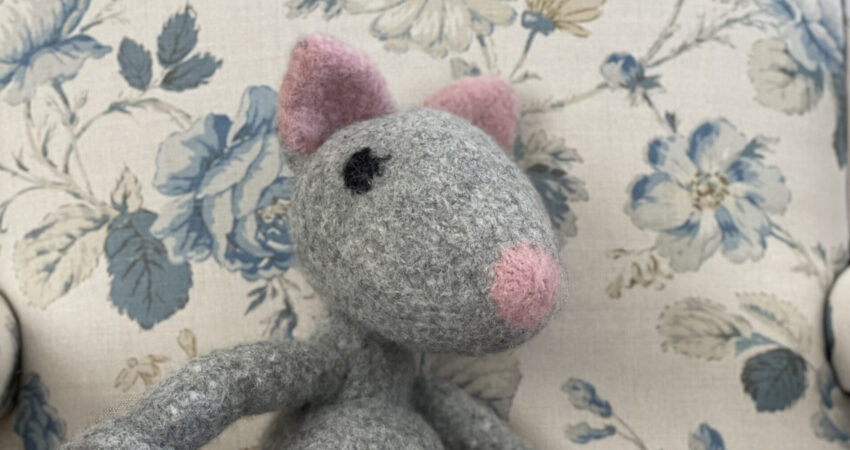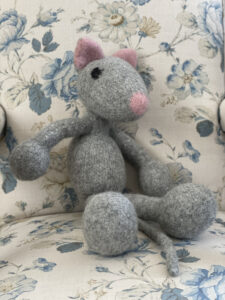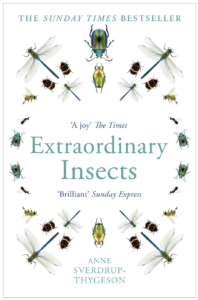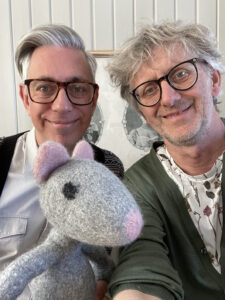We hope you will enjoy this week’s podcast of Sit and Knit for a Bit. There is, as usual, a lot to get through in “15 minutes”! Click on the below photo of Magnus, the knitted and felted Mouse, to purchase the pattern. If you already have the original pattern, please continue scrolling to the end of this post to see all the information about what needles and yarn we used before felting the mouse, as well as our tips and advice on how to achieve the best results when felting.
Watch the entire podcast here:
Please accept YouTube cookies to play videos on arnecarlos.com
By accepting you will be accessing content from YouTube, a service provided by an external third party.
If you accept this notice, your choice will be saved and the page will refresh.
Chapters:
0:00 The whole gang is here
2:17 The weather in Norway
3:34 Kate in the last homely house
8:30 Outhouse
17.07 Answering some felting comments
24:27 Magnus the mouse felted
32:18 Atlantic Crossing
36:09 Update on books and embroidery
44:48 The picnic basket
53:35 Astrological signs
1:06:49 Another thrift store find
Extraordinary Insects by Anne Sverdrup-Thygeson
And here is the amazing book about insects that I just couldn’t put down. The entire book, from beginning to end and Chapter 2 in particular, was fascinating! Click on the image to get more information about the author. The book is available in many languages, including English! We have checked, and the book is available on Amazon, but we’d like to encourage you to buy it from a local bookstore if you can.
Fruity Knitting
We usually record our “Sit and Knit for a Bit” podcast early on Monday mornings and had already recorded this week’s podcast when we received the devastating news about Andrew Doig from Fruity Knitting. We are both deeply saddened to learn of his death, and we offer our sincere condolences to his wife Andrea and their daughter Madeleine. Although we never met Andrew and Andrea in person, we have liked watching their podcasts, and we always enjoyed Andrew’s contributions to the show. He was a gentle and kind soul, and he will be greatly missed by us as well as the rest of the knitting community.
We want to encourage you to continue supporting Fruity Knitting through Patreon. Click on this link to visit their website, and from there, you will be able to follow their links to their Patreon site: Fruity Knitting
Yarn: You will need a yard that will felt, so make sure that the wool yarn you select is non-superwash. We chose Schachenmay’s Wash+Filz-it!, which is a bulky yarn.
Quantities: 5 balls (250 grams) of Schachenmayr “Wash+Filz-it!” yarn in colour 21 Steel, 1 ball (50 grams) of Schachenmayr “Wash+Filz-it! yarn in colour 11 pink, and a little black yarn for the eyes.
If you can’t find the yarn we used, click here for all substitutions available.
Needles: One set of dpns size 8.0 mm / U.S. size 11
Stuffing: We normally recommend 100% wool batting, but for felting, use 100% acrylic stuffing, as the wool batting may become lumpy and felt as well, while the acrylic will bounce back to its original form.
Felting the mouse: Knit the mouse according to the same pattern as the regular mouse, stuff it and finish it completely.
Put in the washing machine and add the detergent you would normally add to wash your clothes.
Add a few things that may assist the felting process. We added a pair of Converse sneakers. You could also add a couple of tennis balls or a towel or a pair of jeans. DO NOT OVERFILL the machine; only add a few items – as it is the movement that does the felting. If the machine is overstuffed with other clothes, the mouse won’t felt.
We used our regular cycle for washing white clothes and a warm temperature of 40 degrees Celsius and repeated the washing cycle twice. Keep in mind temperature is irrelevant to the felting. It is the movement that will do all the work.
Originally, our mouse was 70 cm (27 1⁄2 in) tall. After two washes, he is now 50 cm (19 1⁄2 in) tall.
When the second cycle is done, take the mouse and squeeze the snout and legs to shape them better. Make sure you do this while the yarn is still wet.
Disclaimer: Felting is not easy to control, and therefore, we do not have any answers to many of the questions we usually get. Every washing machine is different, and things like the quality of the water and even the dye of the yarn will affect the end result. Some of you will only need to do one washing cycle, while others may need to do three or four or more before you achieve the desired result. If you follow our instructions, there is still no guarantee that your mouse will felt exactly the same way as ours or even be the same size. Because of this, we encourage you to experiment yourself and take everything written here as a guideline.
ENJOY!
ARNE & CARLOS






Skip to comment form
I am almost ready to felt the large Magnus. I am so excited to see how it turns out. I hope I put in enough poly fill to make it nice. I also want to knit some clothes for it. I guess I should just use the fatter yarn and a larger needle and not felt the clothes? zany suggestions? Or maybe knit some American girl doll clothes to fit Magnus.
PS I used two strands of a nice felting wool yarn (suggested by the owner of the LYS) as the suggested yarn was not available at my LYS.
How do you think felting the horse would turn out? Of course I would make the original about 1/3 bigger. However, I’m worried about how the legs would come out.
So I am not great with blogs yet but having found a couple of knitting and yarn ones I am trying. I love the flower coaster pattern but my favorite part is the colors listed followed by the words and other colors. I love that you live in colors.
I just ordered your Easiest Sock in the World pattern, and a ball of your 6-ply Regia design yarn in Starnight. I hope both will help me with my abysmal record of sock-finishing. I have not finished a pair of socks since 1972.
I was pretty excited to realize I had purchased your garden book at a local yarn shop earlier this year. I am looking forward to making Magnus for my grandson.
I ordered the Magnus pattern which is for the small mouse. If I want to make the large magnus I understand the use of fatter yarn. What about knitting the clothes for the larger Magnus? Just use the bulky yarn for the clothes also? And larger needles?
The US title of the insect book is Buzz Sting Bite: Why We Need Insects. Chapter two is a good one! What a fun, accessible book about the essential place of insects in the world’s ecosystems. Thank you for mentioning it!
I am also making the felted mouse and would like to make the clothes for it too. I am wandering if you have gotten a response about it?
Hi Arne and Carlos
I have gotten the garden mouse pattern, and I am knitting the felting one. My question is : What size yarn are the clothes knitted for the felted mouse as the original pattern is way to small for this one?
Thank you and I love the mouse!
I have made Magnus Mouse many times….DK weight and using your wonderful sox yarn. Now I am going to use Rauma Strikkegarn and felt him! Fun to try. Thanks for you guys who brighten my day. Donna
Arne and Carlos, you have transformed my life. I’ve started knitting the way you do, I’m using 5 prym dpns, making your socks pattern I bought.
Lots more to say,
Thank you both sooo much.
Susan
WHERE do I find the video of Arne using a food processor to felt the pompoms? Enjoy your trip. Here in Arizona we are being advised to NOT travel. Pity since I have cousins an hour and a half and a few hours away that I’M dying to see. 🙁
Carlos! From one Virgo to another ditch the 007 “picnic basket” or at least switch out the plastic for enamel dinnerware. You’re both looking so healthy, I hope you have a marvelous trip.
Finding your podcast has been a blessing during lockdown. Today you mentioned Sir Roy Strong who is a true English eccentric. Did you know he is selling the contents of his house because he is downsizing ? Arne would love some of the objects he has. You are right about books in a house and how they make you feel. Antony Powell a British novelist wrote a novel called ‘Books do furnish a Room ‘ A very good title. Enjoy your trip.
Hi Arne (& Carlos), I understand the pattern is just the same, # of stitches, just a lot chunkier yarn?
Do you have a tip or advice how to make the clothes larger? Or do I just eyeball it?
(I am so going to do the large felted version of Magnus, with a Christmas sweater!! Such a fun idea!!)
I so enjoyed the podcast. I am from Northern alberta and the other day the day temperature was 23 C with a snowfall warning for night. Enjoy trip
Please help with the Reine hat pattern. I am confused by the decreases starting at row 34. There are no asterisks to show repeats.
So kind of you to encourage support of Fruity Knitting. I discovered Andrew and Andrea during lockdown and really enjoyed their podcasts.
Arne and Carlos, no matter what is happening in my life, your videos always make me laugh. You are so entertaining!
When I grew up in the 1960’s in rural Alberta we too had outhouses complete with old mail order catalogues to use as needed. A Halloween night custom with rowdy teenagers was pushing the outhouses over (these were nothing like the classy ones you’ve been discussing).
I have always had a fascination with picnic baskets and I would probably not have been able to resist buying Arne’s unique suitcase. A few years ago, I saw a picnic basket backpack and I’ve always regretted not buying it. Although the plastic dishes are very practical, perhaps you could outfit it with some dishes and cutlery that would complement your lovely cushions and blankets in the Beetle. The plastic ones could be re-purposed somewhere else and you could have a new Thrift Shop adventure looking for dishes. Just a suggestion!
Enjoy your trip this week. You deserve it!
Carlos you have not been as active in the last year. Your muscles need tuning up.
OMG Arne, when I first came to America I was pregnant in my ninth month. My parents-in-law gave a welcome party for me and one if their friends asked me what sign I am.
My answer was, “I am a virgin!”
There were a few questioning eyes on me and I heard some laughter.
So, I am a Virgo, like Carlos. I am creative and while I work on something I can even create a bit of chaos, but after each creation I need to put things back in their proper place, because I cannot stand a big mess for very long. I think Virgos are rather complicated. 😄
I have to let you know that in Canada, via PBS of New York, there is a show about the Norwegian Royal family during the war, when the King and his son left and went to England and Olaf’s wife went to the US for safety brought by the President. It is called, Atlantic Crossing. We are very much enjoying it.
I love the picnic basket! Bright-colored plastic is the most cheerful thing in the world! So there, Carlos.
I’m a Pisces so I inhabit the same cluttered universe that Arne does, but I have never had such a tolerant roommate, more’s the pity!
Bonjour d`Ottawa, Canada
Thank you for your conversations and allowing us a visit with you this spring.
Questioni – could you tell me what do you put in as filling for the numerous beautifull cushions that adorn the furniture.
Wishing you sunny sky and safe drive for your “promenade”.
Stay safe, big hug!
👍You two are so funny! I really enjoy watching all of your Sit And Knits for a Bit plus all the others. What was the name of Arne’s book he was reading?
Have a great trip and enjoy getting out of the house!
The demonstration of the “picnic basket” is so funny. I love spending time with you.
I enjoyed a few days in Trondheim when my niece and I were traveling north to Alta.
Kristine
Oregon USA
I love you guys! Just like hanging out with friends.
Enjoyed your comments on Atlantic Crossing! We are watching and enjoying it! Our local channel is posting Fact Checking questions in between the showing of the episodes! They are pointing out various “artistic license” issues, which help with the dramatization, even though they aren’t historically accurate! I especially love the vintage clothing and jewelry!
Did you try using a salad spinner for felting?